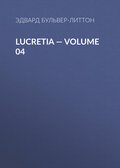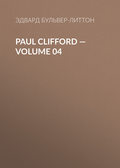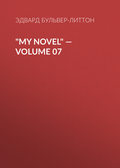
Эдвард Бульвер-Литтон
The Caxtons: A Family Picture — Volume 11
"But we have not yet heard Kitty to the end, Roland."
"I beg your pardon a thousand times, ma'am—sister," said the Captain, bowing.
"Well, I was going to add," said my mother, "that we will go and live with you, Roland, and club our little fortunes together. Blanche and I will take care of the house, and we shall be just twice as rich together as we are separately."
"Pretty sort of hospitality that!" grunted the Captain. "I did not expect you to throw me over in that way. No, no; you must lay by for the boy there. What's to become of him?"
"But we shall all lay by for him," said my mother, simply,—"you as well as Austin. We shall have more to save, if we have more to spend."
"Ah, save!—that is easily said; there would be a pleasure in saving, then," said the Captain, mournfully.
"And what's to become of me?" cried Squills, very petulantly. "Am I to be left here in my old age, not a rational soul to speak to, and no other place in the village where there's a drop of decent punch to be had? 'A plague on both your houses!' as the chap said at the theatre the other night."
"There's room for a doctor in our neighborhood, Mr. Squills," said the Captain. "The gentleman in your profession who does for us, wants, I know, to sell the business."
"Humph," said Squills,—"a horribly healthy neighborhood, I suspect!"
"Why, it has that misfortune, Mr. Squills; but with your help," said my uncle, slyly, "a great alteration for the better may be effected in that respect."
Mr. Squills was about to reply when ring—a—ting—ring—ting! there came such a brisk, impatient, make-one's-self-at home kind of tintinnabular alarum at the great gate that we all started up and looked at each other in surprise. Who could it possibly be? We were not kept long in suspense; for in another moment Uncle Jack's voice, which was always very clear and distinct, pealed through the hall, and we were still staring at each other when Mr. Tibbets, with a bran-new muffler round his neck, and a peculiarly comfortable greatcoat,—best double Saxony, equally new,—dashed into the room, bringing with him a very considerable quantity of cold air, which he hastened to thaw, first in my father's arms, next in my mother's. He then made a rush at the Captain, who ensconced himself behind the dumb-waiter with a "Hem! Mr.—sir— Jack—sir—hem, hem!" Failing there, Mr. Tibbets rubbed off the remaining frost upon his double Saxony against your humble servant, patted Squills affectionately on the back, and then proceeded to occupy his favorite position before the fire.
"Took you by surprise, eh?" said Uncle Jack, unpeeling himself by the hearth-rug. "But no,—not by surprise; you must have known Jack's heart: you at least, Austin Caxton, who know everything,—you must have seen that it overflowed with the tenderest and most brotherly emotions; that once delivered from that cursed Fleet (you have no idea what a place it is, sir!), I could not rest, night or day, till I had flown here,—here, to the dear family nest,—poor wounded dove that I am," added Uncle Jack, pathetically, and taking out his pocket-handkerchief from the double Saxony, which he had now flung over my father's arm-chair.
Not a word replied to this eloquent address, with its touching peroration. My mother hung down her pretty head and looked ashamed. My uncle retreated quite into the corner and drew the dumb-waiter after him, so as to establish a complete fortification. Mr. Squills seized the pen that Roland had thrown down, and began mending it furiously,—that is, cutting it into slivers,—thereby denoting, symbolically, how he would like to do with Uncle Jack, could he once get him safe and snug under his manipular operations. I bent over the pedigree, and my father rubbed his spectacles.
The silence would have been appalling to another man nothing appalled Uncle Jack.
Uncle Jack turned to the fire, and warmed first one foot, then the other. This comfortable ceremony performed, he again faced the company, and resumed, musingly, and as if answering some imaginary observations,—
"Yes, yes, you are right there; and a deuced unlucky speculation it proved too. But I was overruled by that fellow Peck. Says I to him, says I, "Capitalist"!—pshaw! no popular interest there; it don't address the great public! Very confined class the capitalists, better throw ourselves boldly on the people. Yes,' said I, 'call it the "Anti- Capitalist."' By Jove! sir, we should have carried all before us! but I was overruled. The 'Anti-Capitalist'!—what an idea! Address the whole reading world, there, sir: everybody hates the capitalist—everybody would have his neighbor's money. The 'Anti-Capitalist'!—sir, we should have gone off, in the manufacturing towns, like wildfire. But what could I do?—"
"John Tibbets," said my father, solemnly, "Capitalist 'or' Anti- Capitalist,' thou hadst a right to follow thine own bent in either,—but always provided it had been with thine own money. Thou seest not the thing, John Tibbets, in the right point of view; and a little repentance in the face of those thou hast wronged, would not have misbecome thy father's son and thy sister's brother!"
Never had so severe a rebuke issued from the mild lips of Austin Caxton; and I raised my eyes with a compassionate thrill, expecting to see John Tibbets gradually sink and disappear through the carpet.
"Repentance!" cried Uncle Jack, bounding up as if ha had been shot. "And do you think I have a heart of stone, of pumice-stone? Do you think I don't repent? I have done nothing but repent; I shall repent to my dying day."
"Then there is no more to be said, Jack," cried my father, softening, and holding out his hand.
"Yes!" cried Mr. Tibbets, seizing the hand and pressing it to the heart he had thus defended from the suspicion of being pumice, "yes,—that I should have trusted that dunderheaded, rascally curmudgeon Peck; that I should have let him call it 'The Capitalist,' despite all my convictions, when the Anti—'"
"Pshaw!" interrupted my father, drawing away his hand.
"John," said my mother, gravely, and with tears in her voice, "you forget who delivered you from prison; you forget whom you have nearly consigned to prison yourself; you forg—"
"Hush, hush!" said my father, "this will never do; and it is you who forget, my dear, the obligations I owe to Jack. He has reduced my fortune one half, it is true; but I verily think he has made the three hearts, in which he my real treasures, twice as large as they were before. Pisistratus, my boy, ring the bell."
"My dear Kitty," cried Jack, whimperingly, and stealing up to my mother, "don't be so hard on me; I thought to make all your fortunes,—I did indeed."
Here the servant entered.
"See that Mr. Tibbets's things are taken up to his room, and that there is a good fire," said my father.
"And," continued Jack, loftily, "I will, make all your fortunes yet. I have it here!" and he struck his head.
"Stay a moment!" said my father to the servant, who had got back to the door. "Stay a moment," said my father, looking extremely frightened,— "perhaps Mr. Tibbets may prefer the inn!"
"Austin," said Uncle Jack, with emotion, "if I were a dog, with no home but a dog-kennel, and you came to me for shelter, I would turn out—to give you the best of the straw!"
My father was thoroughly melted this time.
"Primmins will be sure to see everything is made comfortable for Mr.
Tibbets," said he, waving his hand to the servant. "Something nice for supper, Kitty, my dear,—and the largest punch-bowl. You like punch, Jack?"
"Punch, Austin!" said Uncle Jack, putting his handkerchief to his eyes.
The Captain pushed aside the dumb-waiter, strode across the room, and shook hands with Uncle Jack; my mother buried her face in her apron, and fairly ran off; and Squills said in my ear, "It all comes of the biliary secretions. Nobody could account for this who did not know the peculiarly fine organization of your father's—liver!"






